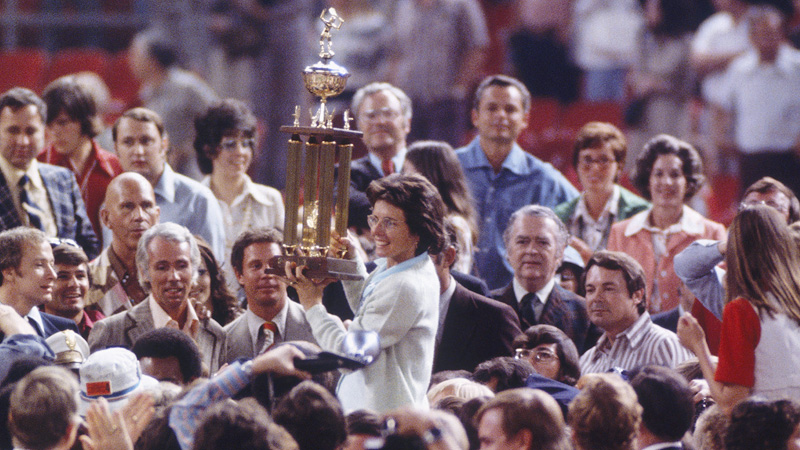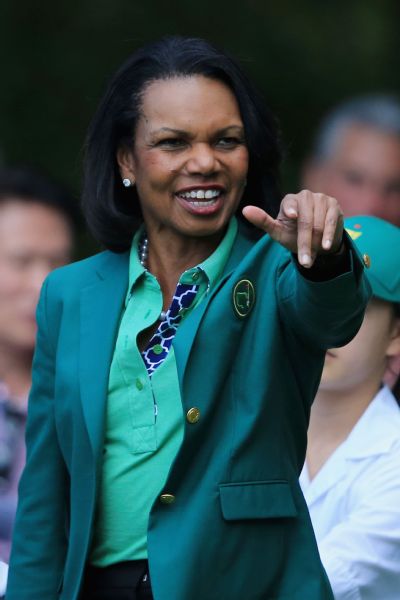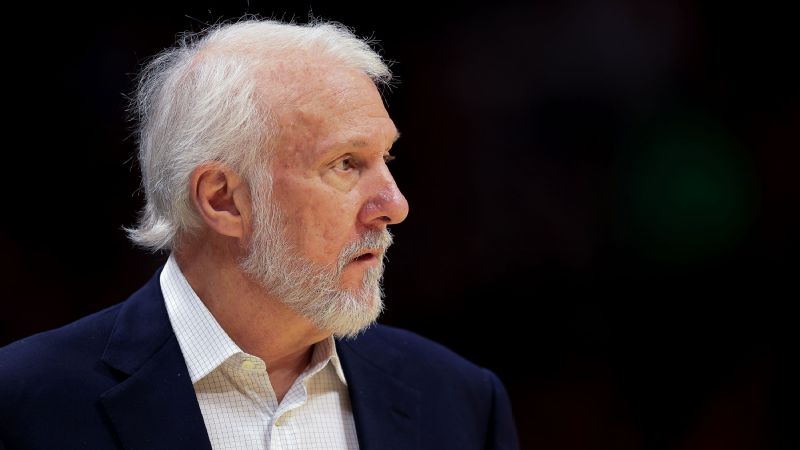
Billie Jean King holds up her trophy after beating Bobby Riggs in the 1973 Battle of the Sexes. Gender, nationality, race, ethnicity — all of these issues have always been part of the sports fabric, writes espnW’s Kavitha Davidson.
Sports are, at a baseline, the ultimate meritocracy. There’s a winner and a loser, and the outcome is seldom in question — a rarity in a world that’s mostly gray. And yet, sports have never been wholly separated from politics, from race, from gender, from business, from society. Sports are, and always have been, a microcosm of where we find ourselves as a country — perhaps as a world.
As with any other form of entertainment, the ability to think of sports outside of our society has been a privilege of those who, until now, haven’t been affected by their consequences.
Tell Jesse Owens he should’ve “stuck to sports” when his four gold medals and record-setting performance in the 1936 Berlin Olympics directly flew in the face of Adolf Hitler’s plan to use the Games as a showcase for supposed Aryan superiority.
Tell it to Babe Didrikson Zaharias, a multisport Olympian who, in 1938, became the first woman to play in a men’s PGA tournament and often dealt with misogynistic criticism of femininity versus her athleticism. So much so that, when she took up golf, the then-Olympic gold medalist changed her wardrobe and wore lipstick to fit the expectation of how a woman should look. “I know I’m not pretty, but I try to be graceful,” she said at the time.
Tell that to Jackie Robinson or Muhammad Ali or Kareem Abdul-Jabbar, or to Billie Jean King or Venus Williams, who, in different eras, fought for the same level of pay equality for men and women.
Tell that to black players, Irish players, Italian players, female players, all of whom have fought over decades and centuries for the right to merely exist as athletes, to contribute highly sought-after skills that have long transcended artificial barriers.
Irish athletes made it on the baseball field and in the boxing ring in the 19th century, when stores hung “no Irish need apply” signs and newspapers portrayed Irish immigrants as terrorists.
Female students parlayed Title IX, the 1972 law prohibiting discrimination at educational institutions, into a silver medal in women’s basketball at the 1976 Olympics. Condoleezza Rice, the former secretary of state and a black woman, was barred from membership at Augusta National Golf Club because of her gender until four-and-a-half years ago. She joined in 2012, when the club began admitting women.
The historical assimilation of immigrants, the “mainstreaming” of black talent, the elevation of women outside of “female” roles, the value of unions, the questioning of government subsidies for corporations in the form of bond abatements for stadiums or league-wide tax breaks — these are all ways sports have never just been about sports, ways in which some of us haven’t been able to just “stick to sports.” These are all ways sports, and sports coverage, can help us understand our world just a little bit better, as long as we continue to elevate those voices that aren’t always heard.
When you really think about it, the division between sports and politics has long been eroded. The separation is what takes effort to uphold — and it’s mostly done by people whose right to exist in this space isn’t questioned.
Some of us have been outsiders for a while, constantly proving that we belong in the sports world. “How did you get to be a sports fan?” is a question I’m asked more often than not. My answer is usually very simple: “I was a New Yorker growing up two subway stops away from Yankee Stadium in the ’90s. How could I not be a sports fan?” Many of us have loved sports even when the feeling wasn’t mutual. Even when the communities surrounding these beautiful games were decidedly exclusionary, even when they told us we didn’t belong.

Condoleezza Rice was admitted to Augusta National Golf Club in 2012.
It often feels like my status as a sports fan is questioned as a coded way to question my status as an American. I’m aware of those implications now more than ever, when our divisions based on race, gender, class, education, religion, geography, have been manipulated into an ever-narrowing definition of what it means to be an American, to be a patriot. I have to ask whether a white man who grew up in the suburbs would be asked how he “got to be a sports fan.”
But the ability of sports to unite along political lines, racial lines, gender lines, religious lines, class lines — that has always been there. We were all Yankees after 9/11, and we were all #BostonStrong after the marathon bombing. Years earlier, across an ocean, South Africa won the 1995 Rugby World Cup behind Nelson Mandela’s pleas for national unity and reconciliation after decades of apartheid.
Sports’ potential to unite has always been there, and so has the ability to recognize when all of these seemingly disparate worlds intersect.
Watching sports with no eye toward the political, or the racial, or the gendered, or what have you, is a privilege many of us have never been afforded, simply because we were perceived as outsiders to mainstream institutions. And it’s not limited to sports. It’s no more possible for a survivor of sexual assault to unemotionally watch her team bring on a player accused of rape than it is for a descendant of Irish immigrants to unemotionally read “Angela’s Ashes.” Nor should it be: Recognizing the importance of sports beyond simple escapism serves to elevate this thing that we love and feel, at times beyond the point of rationality.
The plain fact is that many people are now coming around to the realization that sports can’t just be taken at face value. And that’s OK. Sports can be a barometer for the movements we must make through difficult times — through social tensions, through existential crises. Sports don’t just exist for sports’ sake — sports can be art. You can always find great sports stories that speak to who we were at any point in history.
Hemingway, Kerouac, Thompson — some of our greatest essayists were also our greatest sportswriters. Some of our most important social commentary has come in the form of sportswriting. I would never place myself in the company of those writers, but my conception of myself as a sports fan has always come alongside my conception of myself as a New Yorker, as a woman, as a person of color and as an American.
It’s difficult for me to separate those sides of myself. And it seems to become increasingly difficult for many other sportswriters to separate their sports sides from their human sides, to separate their journalism from their morality. Sure, this paradigm shift seems sudden; as both journalists and human beings, it seems impossible not to question attacks on freedom of the press, not to wonder what an immigration ban means for Mo Farah, not to throw Tom Brady into every conversation possible.
But that’s what has always made sports compelling — as art, as spectacle and, yes, as politics. Sports can reflect the best, and at times the worst, of our collective humanity, and it allows us to experience both ends of that spectrum while studying the fine line that separates the two.





